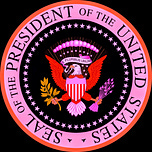Look, you have to understand how unprecedented the situation was. The man was incapable of being president. It wasn't just that he was weak, half-paralyzed, that he mumbled and made no sense a lot of time. That he spent most of the day sleeping, couldn't sit up by himself, and had to be fed like a baby. His whole personality had changed. He seemed incapable of absorbing new information. He was quick to anger. It wasn't clear how much he understood. And there was just no precedent for dealing with a president who could not fulfill the duties of the position. The vice president, you say? Sure, he seems like the obvious person to step in, but the man clearly didn't want the job. And the president's enemies were circling like sharks. There were plenty who wanted to get rid of him. Name names? You bet I'll name names. That Senator, Albert Fall, who yelled on the Senate floor that we had a petticoat government, that "Mrs. Wilson is president!"
I was never president; that was ridiculous. Yes, I decided what he should see and what he shouldn't. I answered correspondence. I held his hand in mine and helped him sign his name to things I knew he'd want to sign. Who was I to make these decisions? Just the person who had discussed everything, always, with the president up to that point. Just the companion of his heart and mind. I knew what he would have wanted. When I didn't, I just ignored the problem. I had a pile of unanswered requests. Irresponsible you say. Recall that protecting my husband was my first priority. Running the country came second.
Besides, don't think for a minute that I don't know where all the hate and vitriol were coming from. Of course there was a lot of panic about women getting too much power, with suffragettes marching in the streets and chaining themselves to the White House fence. I didn't like it any more than my dear husband did. But no one cared about that because a lot of the hate was personal to me. I was not liked. I was seen as a bounder, a common little schemer who had used a fabulous figure to snare a big presidential prize. They didn't like that I was a widow. They didn't like that I was uneducated. They didn't like that my late husband had been in trade, that I had run his business and lived independently after he died. They didn't like that Woodrow had been a widower for less than a year. I could do nothing right in the eyes of these people. Even the president's obvious affection for me was seen as suspect. It must be pure lust.
You have to remember, too, that I wasn't just trying to keep the nation on an even keel. I was trying to preserve what was left of my husband. We were basically newlyweds, after all, marrying just before his re-election in 1916. We never had a chance to live a normal life together. Our marriage started out as the war in Europe was looming over the world like a black cloud, and it wasn't long into it when my husband, who won the election with the slogan "He kept us out of the war," decided to take us to war. It was the hardest decision he ever made. But it wasn't his biggest regret.
His biggest regret, and the saddest part of all of this was the killing of the League of Nations. My dear one considered the League his greatest work, and he was planning it even before we got into the war. He wanted to make sure this war ended all wars. He'd been in the middle of making his case for the League of Nations directly to the people of the nation when the stroke took him down. Without his voice standing up for it, exciting the people with the speechmaking skills as only he could, it was only too easy for that stinking Senator Henry Cabot Lodge to stir up doubt and dislike, so that the League didn't stand a chance. Oh, it boils my blood to think about that man. I really think he set the world back 50 years, because if we'd had the League of Nations, would Hitler have invaded Poland and the whole second war started up again so easily?
I know I'm just a simple woman, and I see things in a simple way, but I think the League of Nations would have changed the world. Having an international rule of law, and an agreement among nations to gang up on aggressor nations--how could that be a bad thing? But my dear one was always an idealist. As president of Princeton, he fought to make the school less elitist, and as governor of New Jersey, he fought to make the state less corrupt. He succeeded in the second but not in the first, which, by the way, shows you where the real entrenched problems in our country are. Then there was his long effort to keep us out of that awful war. My husband was a Southern child during the Civil War, so he knew firsthand the ugliness of war. And I know, his feelings about the Confederacy do not stand out as his most progressive, nor his attitudes towards race, but you have to give him the courtesy of understanding where he was coming from. I get it, because I'm a Southerner by birth too.
So I wasn't power-hungry, or stealing presidential power. My goal was just to keep things afloat while my dear one recuperated. Eventually, he could discuss things, but often he'd lose his train of thought. Sometimes he'd just start crying. This was the man who resisted going to war, but when he did go to war, carried it out efficiently and effectively. Oh I know they called him "the Princeton schoolmaster" and "the Presbyterian deacon" or some mean things like that, but Woodrow was smart and idealistic and honorable and no mean politician. He got things done like a child labor law, and an eight-hour workday for railroad workers, that progressives had wanted forever. He helped win the war in Europe. He saw it all as good administration. He once said that after academic politics, regular politics seemed like child's play.
Was he still the man I fell in love with, the outwardly brilliant, privately passionate, totally unique individual? I admit that in the dark hours of the night I asked myself this. And sometimes I cried myself to sleep but in the end, the answer didn't matter: my place was at his side. I know what you'll say--I don't deserve pity. After all, any woman who marries a man nearly twenty years her senior shouldn't be surprised to end up a nursemaid. And frankly, I wasn't surprised by that. What I was surprised by was ending up as president. Not that I was, of course. You know what I mean. But you want me to justify myself and everything I did. And all I can say to that is, I did the very best that I could.














Share this post